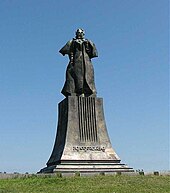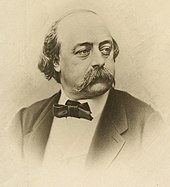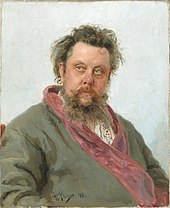Modest Mussorgsky
Such works include the opera Boris Godunov, the orchestral tone poem Night on Bald Mountain and the piano suite Pictures at an Exhibition.[13] The addition of the "g" and the accompanying shift in stress to the second syllable (i.e., Mu-SÓRK-skiy), sometimes described as a Polish variant, was supported by Filaret Mussorgsky's descendants until his line ended in the 20th century.Their example was followed by many influential Russians, such as Fyodor Shalyapin, Nikolay Golovanov, and Tikhon Khrennikov, who, perhaps dismayed that the great composer's name was "reminiscent of garbage", supported the erroneous second-syllable stress that has also become entrenched in the West.[17] Mussorgsky was born in Karevo, Toropets Uyezd, Pskov Governorate, Russian Empire, 400 km (250 mi) south of Saint Petersburg.[26] Borodin later remembered, His little uniform was spic and span, close-fitting, his feet turned outwards, his hair smoothed down and greased, his nails perfectly cut, his hands well groomed like a lord's.He sat at the piano and, throwing up his hands coquettishly, played with extreme sweetness and grace (etc) extracts from Trovatore, Traviata, and so on, and around him buzzed in chorus: "Charmant, délicieux!""[28] Over the next two years at Dargomyzhsky's, Mussorgsky met several figures of importance in Russia's cultural life, among them Stasov, César Cui (a fellow officer), and Mily Balakirev.Mussorgsky and his brother were also inspired by the gothic script, they were using an "M" personal sign instead of family coat of arms, very similar to the symbols of the early Rurikids.Nor is any 'nationalistic' impulse easily discernible in the incidental music for Vladislav Ozerov's play Oedipus in Athens, on which he worked between the ages of 19 and 22 (and then abandoned unfinished), or in the Intermezzo in Modo Classico for piano solo (revised and orchestrated in 1867)."Real life" affected Mussorgsky painfully in 1865, when his mother died; at this point, the composer had his first serious bout of alcoholism, which forced him to leave the commune to stay with his brother.The year 1867 was also the one in which he finished the original orchestral version of his Night on Bald Mountain (which, however, Balakirev criticised and refused to conduct,[33] with the result that it was never performed during Mussorgsky's lifetime[34]).Under the influence of this work (and the ideas of Georg Gottfried Gervinus, according to whom "the highest natural object of musical imitation is emotion, and the method of imitating emotion is to mimic speech"), Mussorgsky in 1868 rapidly set the first eleven scenes of Nikolai Gogol's play Marriage (Zhenitba), with his priority being to render into music the natural accents and patterns of the play's naturalistic and deliberately humdrum dialogue.By the time of the first production of Boris Godunov in February 1874, Mussorgsky had taken part in the ill-fated Mlada project (in the course of which he had made a choral version of his Night on Bald Mountain) and had begun Khovanshchina.Though far from being a critical success – and in spite of receiving only a dozen or so performances – the popular reaction in favour of Boris made this the peak of Mussorgsky's career.His friend Viktor Hartmann had died, and his relative and recent roommate Arseny Golenishchev-Kutuzov (who furnished the poems for the song-cycle Sunless and would go on to provide those for the Songs and Dances of Death) had moved away to get married."[40] Mussorgsky spent day and night in a Saint Petersburg tavern of low repute, the Maly Yaroslavets, accompanied by other bohemian dropouts.[39] For a time Mussorgsky was able to maintain his creative output: his compositions from 1874 include Sunless, the Khovanshchina Prelude, and the piano suite Pictures at an Exhibition (in memory of Hartmann); he also began work on another opera based on Gogol, The Fair at Sorochyntsi (for which he produced another choral version of Night on Bald Mountain).Although now part of a new circle of eminent personages that included singers, medical men and actors, he was increasingly unable to resist drinking, and a succession of deaths among his closest associates caused him great pain.His civil service career was made more precarious by his frequent 'illnesses' and absences, and he was fortunate to obtain a transfer to a post (in the Office of Government Control) where his music-loving superior treated him with great leniency – even allowing him to spend three months touring twelve cities as a singer's accompanist in 1879.Mussorgsky's most imaginative and frequently performed work is the cycle of piano pieces describing paintings in sound called Pictures at an Exhibition.Mussorgsky's single-movement orchestral work Night on Bald Mountain enjoyed broad popular recognition in the 1940s when it was featured, in tandem with Schubert's 'Ave Maria', in the 1940 Walt Disney animated film Fantasia.In talent he is perhaps superior to all the [other members of The Five], but his nature is narrow-minded, devoid of any urge towards self-perfection, blindly believing in the ridiculous theories of his circle and in his own genius.Critic Edward Dannreuther, wrote, in the 1905 edition of The Oxford History of Music, "Mussorgsky, in his vocal efforts, appears wilfully eccentric.[54] The first 20 seconds of Michael Jackson's 1995 song "HIStory" relies on an orchestrated version of "The Bogatyr Gates (In the Capital in Kiev)" fragment of The Pictures at an Exhibition.[55] The 2020 film Eurovision Song Contest: The Story of Fire Saga starring Dan Stevens as Alexander Lemtov, a flamboyant singer representing Russia, had a non-typical Russian character development as an obvious cultural reference to Modest Mussorgsky, also known domestically for encouraging a female opera singer Daria Leonova [ru] to compose a classical song "Letter After the Ball".
Mussorgsky,
c.
1870














Mussorgsky (disambiguation)romanizedThe Five.Russian musicRomantic periodhis worksRussian folkloreBoris GodunovNight on Bald MountainPictures at an ExhibitionKarevo, Pskov OblastVelvet BookboyarsMily BalakirevVladimir Stasovdvoryaninstressmutability of the second-syllable vowelFyodor ShalyapinNikolay GolovanovTikhon KhrennikovThe Grove Dictionary of Music and MusiciansintervocalicvoicedSlavic languagessibilantLate LatinPreobrazhensky RegimentKarevoPskov GovernorateSaint PetersburgMussorgskyRuthenianSmolenskJohn FieldFranz LisztPetrischuleimprovisationsAlexander BorodinfoppishnessTrovatoreTraviataAlexander DargomyzhskyMikhail GlinkaCésar CuiRimsky-KorsakovBeethovenSchumannSchubertGlinkaA Life for the TsarAnatoly Lyadovgothic scriptthe symbols of the early Rurikidssonata formVladislav Ozerovemancipation of the serfsSalammbôChernyshevskykuchkaThe Stone GuestDon JuanPushkinrecitativeGeorg Gottfried GervinusNikolai GogolMarriageZhenitbaKaramzinprima donnaMariinsky TheatreKhovanshchinaViktor HartmannArseny Golenishchev-KutuzovSunlessSongs and Dances of DeathSir Harry LauderIlya RepinBacchusThe Fair at SorochyntsiTikhvin CemeteryAlexander Nevsky Monasteryseizuresdelirium tremensAlexander IIIList of compositions by Modest MussorgskyRomanticDmitri ShostakovichSergei ProkofievMariinsky OperaNikolai Rimsky-KorsakovMaurice RavelAve MariaWalt DisneyFantasiasong cyclesThe NurseryMephistopheles' Song of the FleaVladimir RosingBoris ChristoffSergei LeiferkusTchaikovskypart-writingmodulationscoringSorochintsï FairNadezhda von MeckThe FiveEdward DannreutherGerald AbrahamChernobogFranz Schubertprogressive rockEmerson, Lake & PalmerGreg Lakea live album of the same nameMichael JacksonHIStoryDan StevensEastern Slavic naming customspatronymicfamily nametransliteration of RussianEmancipation reform of 1861Baltic GermansMikhail Katkov